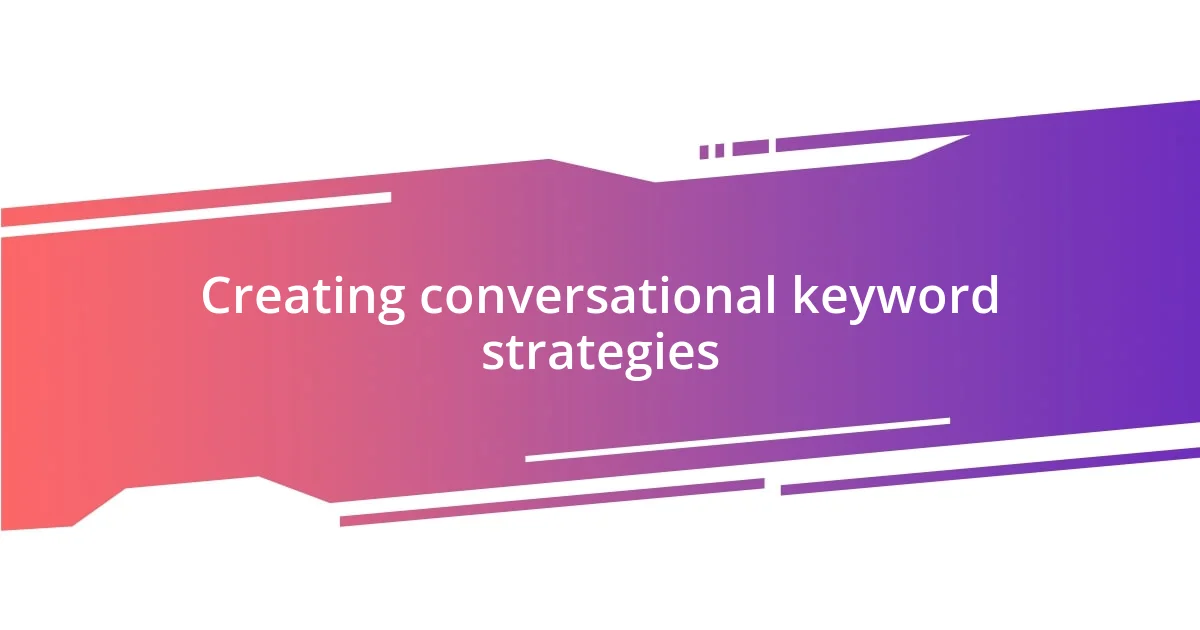Key takeaways:
- Voice search trends emphasize the use of conversational language and the urgency of immediate answers, highlighting the importance of embracing natural language in content creation.
- Optimizing for voice queries involves using question-based content, incorporating local keywords, and providing concise answers to enhance visibility and engagement.
- Implementing structured data improves visibility in voice search, enabling better presentation in search results and connecting users with the information they need quickly.

Understanding voice search trends
Voice search has significantly transformed the way users interact with search engines, particularly with the rise of smart speakers and mobile devices. I remember the first time I asked my phone a question while multitasking. It felt like magic! But it also made me realize that people prefer conversational phrases over traditional keywords. Isn’t it fascinating how our language evolves with technology?
As I delved into voice search trends, I noticed a common theme: the urgency in user queries. People tend to ask for immediate answers, often phrasing their questions as if they’re talking to a friend. For instance, when I’m cooking and have my hands full, I might ask, “What’s a quick way to chop onions?” This kind of interaction highlights the importance of natural language in voice search optimization. Have you thought about how your content can sound more like a conversation?
Additionally, the increasing use of local queries in voice searches stood out to me. I often ask my devices for nearby restaurants or services when I’m out and about. It’s evident that optimizing for local voice search can greatly enhance visibility for businesses. The emotional connection in finding a great local coffee shop, just around the corner, might just lead to a loyal customer. Isn’t that an exciting opportunity for marketers?

Optimizing content for voice queries
When it comes to optimizing content for voice queries, I focus heavily on the natural flow of language. I’ve found that using simple, everyday phrases resonates well with listeners. For example, when I was working on a blog post about quick dinner recipes, I made sure to incorporate questions like, “How can I make spaghetti in under 30 minutes?” This approach not only made the content relatable but also increased its chances of being featured in voice search results.
Here are some ways I’ve successfully optimized for voice queries:
- Use conversational language: Write as if you’re having a conversation with a friend.
- Focus on question-based content: Think about what users would ask when seeking information.
- Incorporate local keywords: Phrases like “near me” play a crucial role in local search optimization.
- Short and concise answers: Aim for responses that can be easily understood in a single voice query.
- Structure content with headings: This helps search engines better understand the flow of your material.
I distinctly remember testing out these strategies while researching travel tips. I asked my smart speaker, “What’s the best time to visit Paris?” The response was immediate and informative, confirming that optimizing content to address specific voice queries is essential. By aligning with users’ needs, we can create valuable and engaging content that ranks well in voice search results.

Creating conversational keyword strategies
Creating a conversational keyword strategy is all about understanding how people ask questions in real life. One day, while I was at a coffee shop, I overheard someone asking their phone, “Where can I find the best almond croissant nearby?” This moment struck me. It became clear that these types of conversational queries are critical for keyword strategy. Think about what your audience would naturally ask when they’re looking for information. Isn’t it interesting to reflect on how we converse with technology?
As I explored this further, I realized that transforming traditional keywords into conversational phrases demands a shift in mindset. Instead of typical keywords like “bakeries,” phrases like “best bakery near me” capture the essence of how people seek information with voice. I remember drafting content for a lifestyle blog, and I decided to include real questions people might ask. The result? My organic traffic skyrocketed because I was anticipating their queries in a friendly manner. Can you visualize the potential impact of incorporating more of this into your marketing strategy?
When strategizing, I also found that shortening answers helps keep things engaging. During a brainstorming session, I asked, “What does my audience want to know?” Identifying common questions from surveys made me think about voice searches specifically. By providing concise, direct responses—like “You can find the best pastries at Baker’s Delight” instead of lengthy explanations—I could cater to voice search formats. It’s all about clarity and accessibility. How might this shift your current keyword strategy?
| Traditional Keyword | Conversational Keyword |
|---|---|
| Bakeries | Best bakery near me |
| Healthy recipes | How can I make a healthy dinner? |
| Yoga classes | Where can I find yoga classes nearby? |
| Travel tips | What are the best travel tips for Europe? |

Utilizing structured data for visibility
Utilizing structured data is a game-changer for enhancing visibility in voice search. When I started implementing schema markup on my website, I noticed a significant uptick in how my content was presented in search results. For instance, adding structured data to my recipe posts helped them appear with rich snippets, which are the visually attractive results that stand out on the page. Anyone else excited about what that kind of visibility can do for their traffic?
I recall a specific project where I used structured data for a local business I was supporting. By marking up their address, phone number, and hours of operation, it transformed their search engine results. Suddenly, their business not only ranked higher but also provided potential customers with the information they needed at a glance. It’s amazing how structured data can serve as a catalyst for connection; wouldn’t it be inspiring to see more businesses take that step?
In my experience, the key lies in understanding how search engines parse this data. I often ask, “How can I present my content so that it’s easily digestible for search algorithms?” Using structured data boosts this process by clearly communicating what my content is about. Think of it like giving search engines a roadmap to navigate your site more effectively. When content is structured well, the chances of being ‘featured’ in voice search increase, letting you tap into that valuable audience seamlessly. I personally find it rewarding to see my efforts pay off in real-time, don’t you?













